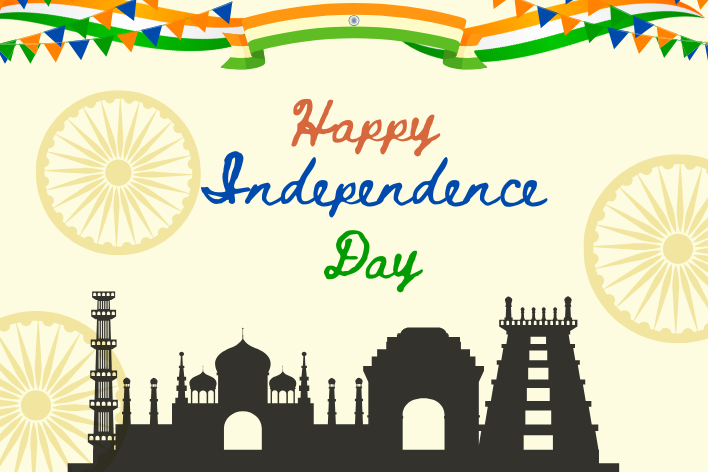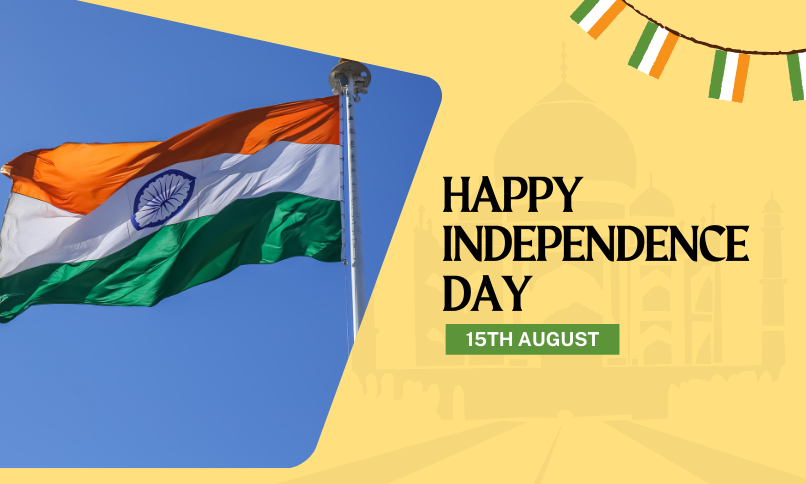Independence Day: A Celebration of Freedom and National Pride
Introduction
Independence Day is one of the most significant occasions in the history of any nation. It marks the day when a country breaks free from colonial rule, oppression, or any external control and establishes itself as a sovereign entity. For India, this day falls on the 15th of August every year, commemorating its independence from British rule in 1947. It is a day of immense national pride, unity, and remembrance of the struggles and sacrifices of countless freedom fighters who laid down their lives for the cause of liberation.
This essay explores the historical background, significance, celebrations, and the continuing relevance of Independence Day, along with its impact on different aspects of society.
Historical Background of Indian Independence
The struggle for Indian independence was a long and arduous journey, spanning nearly two centuries. The British East India Company entered India in the early 17th century, primarily for trade. However, over time, they expanded their control through diplomacy and military conquests, eventually establishing British rule over large parts of the country.
Several revolts and movements took place against British rule, the most notable being:
The Revolt of 1857: Also known as the First War of Indian Independence, this was a widespread but uncoordinated uprising against British rule. Though it was suppressed, it sowed the seeds of nationalistic fervor.
The Rise of Nationalism: The late 19th and early 20th centuries saw the rise of nationalistic movements, with leaders such as Bal Gangadhar Tilak, Bipin Chandra Pal, and Lala Lajpat Rai advocating self-rule.
Gandhian Movement: Mahatma Gandhi led several non-violent movements such as the Non-Cooperation Movement (1920), Civil Disobedience Movement (1930), and Quit India Movement (1942), which played a crucial role in weakening British authority in India.
The Role of Subhas Chandra Bose: Bose’s efforts in forming the Indian National Army (INA) and seeking international support for India’s independence added momentum to the freedom struggle.
Partition and Independence: Due to growing communal tensions and political negotiations, India was partitioned into two countries—India and Pakistan—on 15th August 1947. This was a bittersweet moment as independence came at the cost of a painful partition, leading to large-scale displacement and violence.
The Significance of Independence Day
Independence Day holds immense importance in India and beyond. It is not just a day to remember past struggles but also a moment to celebrate the country’s achievements and reaffirm national commitments.
Honoring Freedom Fighters: The day serves as a tribute to the countless men and women who fought for India’s freedom. Their sacrifices are remembered through speeches, cultural programs, and patriotic songs.
Promotion of Patriotism: Independence Day fosters a sense of patriotism among citizens, reminding them of their duty to the nation.
Symbol of Unity: India is a diverse country with various religions, languages, and cultures. Independence Day serves as a reminder of unity in diversity, strengthening the feeling of national integration.
Reflection on Progress: The day is also an opportunity to reflect on the country’s journey since independence, evaluating achievements in areas like economy, science, technology, and social welfare.
Inspiration for the Youth: The younger generation draws inspiration from Independence Day celebrations, motivating them to contribute towards the nation’s growth and development.
Celebrations Across the Country
Independence Day is celebrated with great enthusiasm and fervor throughout the country. The celebrations take place at different levels, from government institutions to schools, colleges, and individual households.
1. National Celebrations at Red Fort
The main celebration takes place at the Red Fort in Delhi, where the Prime Minister hoists the national flag and delivers a speech. The event is attended by dignitaries, military personnel, and thousands of citizens. The speech highlights the achievements of the past year and outlines future policies and goals.
2. Flag Hoisting Ceremonies
Across the country, national and state leaders, as well as local authorities, hoist the tricolor flag in schools, offices, and residential colonies. The national anthem is sung, and patriotic songs fill the air.
3. Cultural Programs
Schools and colleges organize cultural programs, including skits, debates, essay competitions, and songs, to educate students about the significance of Independence Day. These activities instill a sense of pride and awareness in young minds.
4. Parades and March Past
The armed forces, police, and paramilitary forces organize grand parades showcasing their strength, discipline, and achievements. Various states also participate in showcasing their cultural heritage through tableau displays.
5. Kite Flying Tradition
In many parts of India, kite flying is a popular activity on Independence Day. The sky is filled with colorful kites, symbolizing freedom and the joy of independence.
The Role of Media in Independence Day Celebrations
The media plays a crucial role in broadcasting the significance of Independence Day. Television channels and radio stations air documentaries, patriotic movies, and interviews with war veterans and freedom fighters’ families. Social media platforms are flooded with messages of patriotism and reflections on the nation’s progress.
Challenges and Responsibilities Post-Independence
While Independence Day is a moment of pride, it is also a reminder of the challenges that lie ahead. Some of the key areas where India continues to work towards development include:
Eradication of Poverty: Despite economic growth, poverty remains a significant issue that needs to be addressed through education, employment opportunities, and social welfare schemes.
Corruption and Governance: Good governance and transparency are essential for the nation’s progress. Citizens must remain vigilant and hold their leaders accountable.
Education and Skill Development: A strong education system is necessary for national development. India has made progress, but further reforms are needed to ensure quality education for all.
Environmental Sustainability: Rapid industrialization and urbanization have led to environmental concerns. Sustainable development should be a priority to ensure a cleaner, greener future.
National Security and Unity: Maintaining internal harmony and safeguarding borders is crucial for national integrity.
Conclusion
Independence Day is more than just a holiday; it is a day of remembrance, celebration, and reflection. As we celebrate our freedom, we must also recognize our responsibilities as citizens to contribute towards the growth and development of our nation. The true essence of independence lies not just in being free from foreign rule but in ensuring justice, equality, and prosperity for all.
Each Independence Day should inspire us to work towards making India a global leader, upholding the values of democracy, diversity, and progress. By honoring our past and striving for a better future, we can truly celebrate the spirit of independence in its fullest sense.

